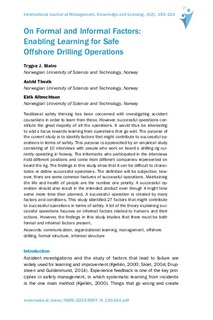| dc.contributor.author | Steiro, Trygve | |
| dc.contributor.author | Thevik, Astrid | |
| dc.contributor.author | Albrechtsen, Eirik | |
| dc.date.accessioned | 2018-04-18T11:55:29Z | |
| dc.date.available | 2018-04-18T11:55:29Z | |
| dc.date.created | 2017-12-11T12:45:43Z | |
| dc.date.issued | 2017 | |
| dc.identifier.citation | International Journal of Management, Knowledge and Learning. 2017, 6 (2), 193-214. | nb_NO |
| dc.identifier.issn | 2232-5107 | |
| dc.identifier.uri | http://hdl.handle.net/11250/2494788 | |
| dc.description.abstract | Traditional safety thinking has been concerned with investigating accident causations in order to learn from these. However, successful operations constitute the great majority of all the operations. It would thus be interesting to add a focus towards learning from operations that go well. The purpose of the current study is to identify factors that might contribute to successful operations in terms of safety. This purpose is approached by an empirical study consisting of 10 interviews with people who work on board a drilling rig currently operating in Norway. The informants who participated in the interviews hold different positions and come from different companies represented on board the rig. The findings in this study show that it can be difficult to characterize or define successful operations. The definition will be subjective; however, there are some common features of successful operations. Maintaining the life and health of people are the number one priority. A successful operation should also result in the intended product even though it might take some more time than planned. A successful operation is created by many factors and conditions. This study identified 27 factors that might contribute to successful operations in terms of safety. A lot of the theory explaining successful operations focuses on informal factors related to humans and their actions. However, the findings in this study implies that there must be both formal and informal factors present. | nb_NO |
| dc.language.iso | eng | nb_NO |
| dc.publisher | International School for Social and Business Studies | nb_NO |
| dc.relation.uri | www.issbs.si/press/ISSN/2232-5697/6_193-214.pdf | |
| dc.rights | Attribution-NonCommercial-NoDerivatives 4.0 Internasjonal | * |
| dc.rights.uri | http://creativecommons.org/licenses/by-nc-nd/4.0/deed.no | * |
| dc.title | On Formal and Informal Factors: Enabling Learning for Safe Offshore Drilling Operations | nb_NO |
| dc.type | Journal article | nb_NO |
| dc.type | Peer reviewed | nb_NO |
| dc.description.version | publishedVersion | nb_NO |
| dc.source.pagenumber | 193-214 | nb_NO |
| dc.source.volume | 6 | nb_NO |
| dc.source.journal | International Journal of Management, Knowledge and Learning | nb_NO |
| dc.source.issue | 2 | nb_NO |
| dc.identifier.cristin | 1525618 | |
| dc.description.localcode | © the Authors. Published by International School for Social and Business Studies. Open Access published under the terms of the Creative Commons CC BY-NC-ND 4.0 License. | nb_NO |
| cristin.unitcode | 194,60,25,0 | |
| cristin.unitname | Institutt for industriell økonomi og teknologiledelse | |
| cristin.ispublished | true | |
| cristin.fulltext | original | |
| cristin.qualitycode | 1 | |

